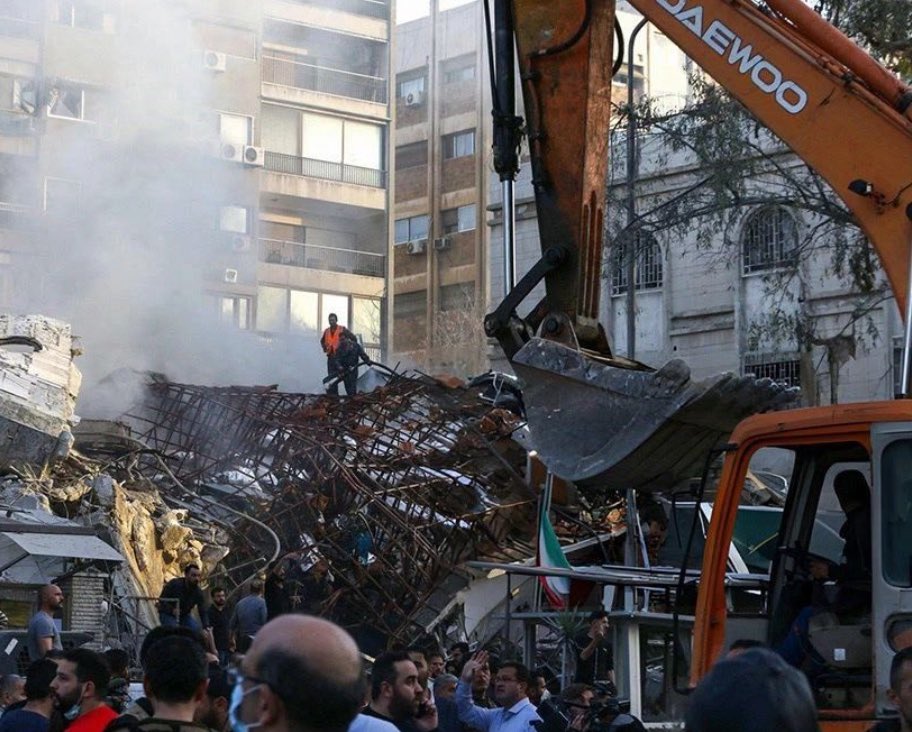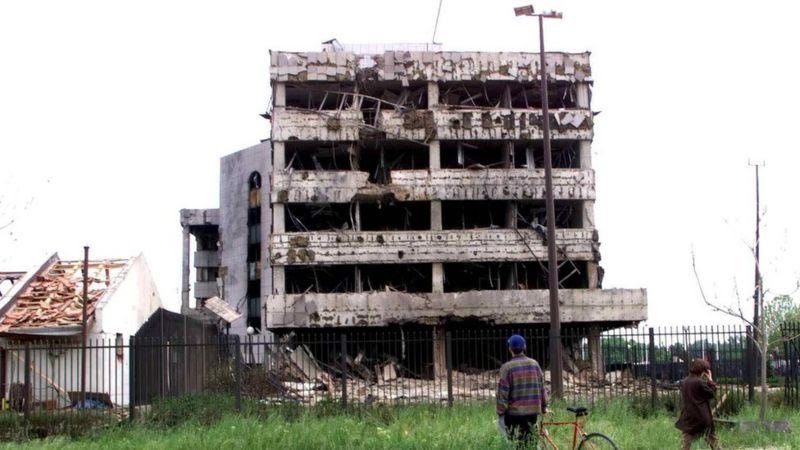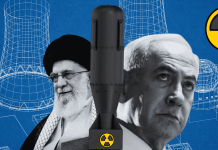In what appears to be an unprecedented escalation, the Israel Air Force (IAF) fighter jets reportedly bombed Iran’s embassy in Syria on April 1, killing several high-ranking officials.
The incident has left the Iranian establishment fuming as the airstrike killed at least seven military advisers and three senior commanders, including Mohammed Reza Zahedi, a top commander in Iran’s elite Revolutionary Guards (IRGC), and senior commander Mohammad Hadi Haji Rahimi. The Iranian consulate building in Syria was also destroyed.
The strike is expected to result in significant escalation between the two bitter adversaries as Zahedi could be singled out as the most well-known Iranian Commander to be eliminated since the assassination of IRGC General Qassem Soleimani in Baghdad in 2020, ordered by former US President Donald Trump.
According to state news agency IRNA, Iran’s President Ebrahim Raisi stated that the strike will “not go unanswered.” At the same time, the country’s Supreme Leader, Ayatollah Ali Khamenei, warned that Israel would suffer consequences.
The Israeli strike on the Iranian consulate, according to Iran’s UN mission, was a “flagrant violation of the United Nations Charter, international law, and the foundational principle of the inviolability of diplomatic and consular premises.”

The Iranian envoy called the strike “a significant threat to regional peace and security” and said Tehran reserved the right “to take a decisive response.” Tehran also asked the UN Security Council to denounce the attack.
The bombing of the embassy comes at a time when Israel has been accused of carrying out a genocide in Gaza. In addition to an incessant bombing campaign in Gaza, the IAF has also intensified air strikes on targets inside Syria and Lebanon, aimed at striking Iran-backed militant organizations like Hezbollah.
Although Israel has attacked Iran’s proxies and military facilities in Syria on several occasions, this was the first time that it has attacked the large embassy complex directly. The bombing was condemned by several Middle Eastern and Gulf-Arab countries. However, Israel’s backers in the West have maintained a studied silence, prompting military watchers to point toward their complicity.
Military watchers and netizens on social media pointed out that the US accords a unique status to its embassies and consulates overseas and those of other nations located in the US. They observed that while the US State Department says that any assault on an embassy is deemed to be an attack on the nation, it has maintained radio silence when a staunch US ally attacked the Iranian embassy.
The experts noted that this showcases the United States’ blatant hypocrisy. A spokesperson for the US White House National Security Council said the United States was not aware of or involved in the strike beforehand.
Typically, Israel keeps its military attacks against Syria under wraps. “We do not comment on reports in the foreign media,” an Israeli military official stated in response to a question regarding the strike. However, four unidentified Israeli officials were earlier quoted by the New York Times as admitting that Israel was the perpetrator of the attack.
Several military watchers, analysts, and netizens said Iran has exhibited patience in the face of multiple provocations involving assassinations. Israel’s bombing of its embassy in Syria not only betrays the inviolability of embassies but also demonstrates to the rest of the world that it can act in this manner without consequence. “It won’t get away with it forever,” wrote one user.
As their Gaza genocide rages, Israel has bombed the Iranian EMBASSY in Syria, killing a senior Iranian military official. Israel has now bombed a food convoy, killing 7 aid workers. Netanyahu wants a US war with Iran. Since Zionists donors control US politicians, he may get one.
— John Moran (@RueDaungier) April 2, 2024
Some analysts said that Israel has been testing Iran’s restraint, and the incident risks a major regional escalation. In the aftermath of the incident, several Iranian protestors flocked to Tehran to express their rage and set fire to the Israeli and American flags.
The bombing is reminiscent of another similar incident that took place several years ago during the US-led Operation Allied Forces that saw the US bombing of the Chinese embassy in Belgrade.
When The US Bombed The Chinese Embassy
The attack on the Iranian embassy was condemned by China, whose own embassy was attacked by the US in the 1990s.
“The security of diplomatic institutions is inviolable, and Syria’s sovereignty, independence and territorial integrity should be respected,” Chinese Foreign Minister Wang Wenbin said at a regular press briefing in response to the attack.
In 1999, an armed confrontation between Albanian separatists from the Kosovo Liberation Army and the Serbian army led to a bombing of what was then the Socialist Federal Republic of Yugoslavia, consisting of Serbia and Montenegro, by NATO forces.
The operation was carried out without the UN Security Council’s sanction and was motivated by claims made by Western nations that the Yugoslav authorities were ethnically cleansing Kosovo Albanians.
Almost 2,500 people, including 87 children, died as a result of NATO airstrikes that lasted from March 24 to June 10, 1999.
The Atlantic Alliance hit hundreds of targets over Serbia and Kosovo during the 1999 air war over Yugoslavia, the majority of which were air defense sites, army headquarters, and other military targets. However, the destruction of one target in particular sparked a surge of anti-Western rallies, namely anti-American protests, halfway around the world – the Chinese embassy in Belgrade.
The US Air Force’s B-2 Spirit bombers dropped five Joint Directed Attack Munition satellite-guided bombs on the Chinese embassy in Belgrade on May 7. The attack claimed the lives of three Chinese journalists: Xu Xinghu and his wife, Zhu Ying from the Guangming Daily, and Shao Yunhuan of Xinhua. At least twenty other Chinese nationals were wounded.

President Bill Clinton responded by apologizing to China in a rare public statement. Clinton expressed his “profound condolences” to the Chinese and stated that the strike was an error.

NATO asserted that it was responding to intelligence, indicating that the embassy served as the site for the Federal Directorate for Supply and Procurement (FDSP) of the former Yugoslavia. However, the Chinese dismissed these reasons.
With the number of civilian deaths from a bombing campaign that was carried out without UN approval and met with strong opposition from China and Russia, the US and NATO were already under fire. Attacking the symbol of Chinese sovereignty turned out to be a massive mistake.
The US Under Secretary of State Thomas Pickering explained in detail the target selection procedure to Chinese officials, saying that the US thought it was hitting a Yugoslav military logistics base and a state-sponsored distributor of missile parts to Libya and Iraq.
Pickering pointed the finger at “multiple factors and errors” that date back to 1997 and named three primary failures: the FDSP building’s identification method was flawed, the US military and intelligence community was completely unaware of the location of the Chinese embassy, and the FDSP’s location was not verified with anyone who was actually in the know.
Shocked by #Israel’s strike on #Iran's consulate in #Syria. Reminds us of what happened to Chinese embassy 25 years ago. We firmly oppose any attack on diplomatic & consular missions, which violates international law and basic norms of international relations. @NATO
— 王鲁彤 Wang Lutong (@WangLutongMFA) April 2, 2024
Nonetheless, the incident caused deep mistrust between the two countries. A wave of anti-American protests swept China despite claims that the strike was an error. They targeted the American embassy in Beijing and consulate buildings in other major cities. Defacement of US diplomatic buildings occurred, and tens of thousands of Chinese protested in Beijing.
- Contact the author at sakshi.tiwari9555 (at) gmail.com
- Follow EurAsian Times on Google News




